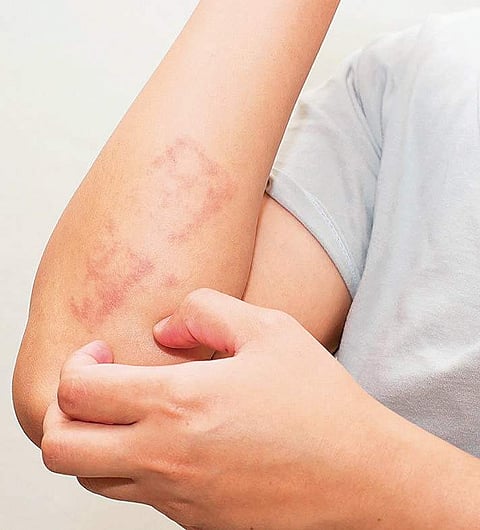

KOCHI: Psoriasis is a genetic condition that causes the body to multiply skin cells in days. It is an immune-mediated condition where the person affected will develop thick patches of red and white scaly skin known as lesions. These lesions may appear anywhere on the body but they typically show up on the elbows, knees, and scalp.
According to the International Federation of Psoriasis Associations, about 125 million people in the world have some form of psoriasis. And 48 per cent of people reported that their psoriasis condition had an impact on their daily-life activities. With a prevalence of 0.44-2.8 per cent in India, it is often seen as a contagious disease and affected people are ostracised from the mainstream. It impairs the quality of life of patients and their families leading to physical, emotional and social trauma.
Patients are often forced to withdraw from social situations that may lead to depression. This psychological distress also worsens the condition in the majority of the patients. In this month of psoriasis awareness, the general public should be aware of this genetic disease and the treatments available for it, the federation says.
The common misconception among the public is that the disease is contagious but fail to understand it is a genetic disease. "Psoriasis is not a communicable disease but genetic and a person with no family history of the disease should not have to worry about it at all," said Dr Shibu Mohammed, consultant, dermatology and venereology at Renai Medicity, Kochi.
There are specific genes that develop the condition in a person. However, the presence of these genes alone would not activate the condition in the body. Environmental, physical and emotional issues trigger the disease. Sun exposure, infections, cold temperatures, cuts, bug bites, certain medications, stress, smoking and excess alcohol consumption are some of the common causes of disease activation.
Since there is no complete cure for the disease, there are certain practices to follow so that it can be controlled. "It cannot be cured but controlled with biological therapies. And using moisturisers regularly can also ease the condition. One should be careful to keep the skin moist. Moisturising the skin as per the climatic conditions is a must practice to follow," he said. Skin needs proper protein. So, it is advised to take protein-rich food and be aware of what kind of food is not suitable for each person's health condition.
Types of psoriasis
Plaque psoriasis: It is the most common type of psoriasis and causes red skin lesions and silver scales.
Scalp psoriasis: It occurs on the scalp. The main symptom is a dry, itchy scalp. Scratching the scalp can cause bleeding.
Nail psoriasis: It can cause the nails to become pitted and discoloured. Results in weak and crumbled nails and even separate from the nail bed.
Psoriatic arthritis: It can affect any part of the body like finger joints and spine. Main symptoms include joint pain, stiffness, and swelling.
Guttate psoriasis: Skin sores appear on the scalp, torso, arms, and legs. The scales are finer than those from other types of psoriasis.
Inverse psoriasis: It causes patches of red, irritated skin in body folds, such as the armpits, under the breasts, or around the genitals and groin.
Pustular psoriasis: In this condition, skin becomes red and tender to the touch. It causes,fever, diarrhea, kidney and liver problems.
Erythrodermic psoriasis: Though rare, it can affect the whole body. It can cause severe itching and pain, and make the skin come off in sheets.